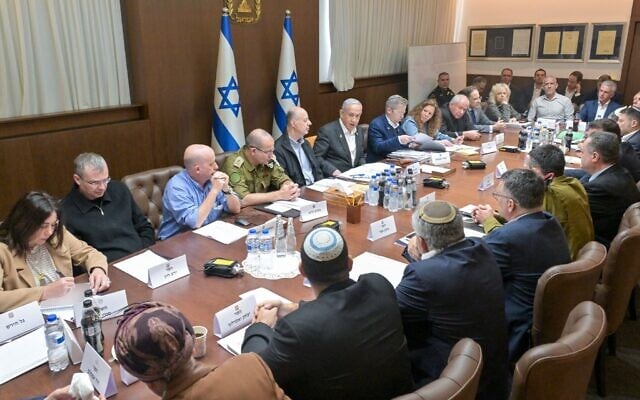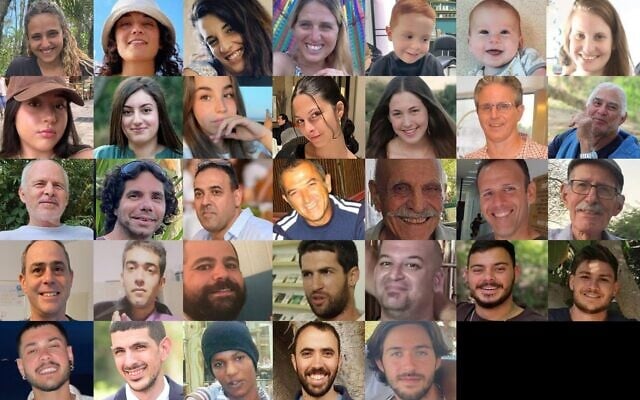First hostages to be freed Sunday afternoon; Smotrich said to agree to stay in coalition; relatives of hostages not set for release in 1st phase urge public support for next stage.
 The security cabinet meets in Jerusalem on January 17, 2025 to discuss the ceasefire-hostage release deal
The security cabinet meets in Jerusalem on January 17, 2025 to discuss the ceasefire-hostage release deal. (Kobi Gideon/GPO)
The high-level security cabinet voted Friday afternoon to approve the hostage release-ceasefire deal with Hamas in Gaza, and recommended that the government adopt it, the Prime Minister’s Office said. The full cabinet then convened for a discussion and vote, with the meeting extending long into Shabbat.
The full cabinet was expected to vote by a large majority to approve the deal, which was signed overnight in Qatar and is set to take effect on Sunday.
The recommendation by the forum of top ministers was made
"after examining all diplomatic, security and humanitarian aspects of the agreement, with the understanding that the deal "supports the achievement of the war’s goals", the PMO said.
Finance Minister Bezalel Smotrich and National Security Minister Itamar Ben Gvir voted against the deal at the security cabinet, but were in the minority. According to Channel 12 news, Likud’s David Amsalem also voted against the agreement.
Before the security cabinet meeting, Prime Minister Benjamin Netanyahu took part in a security assessment to discuss the deal’s implementation with the negotiating team, which returned overnight from Doha after signing the final version of the accord with Hamas.
A meeting of the full cabinet had been slated to begin at 3:30 p.m., but actually started more than two hours later. It had earlier been expected to take place only on Saturday evening, but was moved up after numerous ministers, including Haredi members of the cabinet, said Shabbat considerations should not put off a life-saving matter.
The deal, announced by mediators on Wednesday, is currently scheduled to take effect on Sunday at 12:15 p.m. Unconfirmed reports in Hebrew media said the release of the first three female hostages was expected at 4 p.m. that day. Israel was expected to get the identities of the first returnees from Hamas by 4 PM on Saturday.
Thursday evening saw reports that holding the full cabinet meeting only on Saturday evening would cause a delay in the deal’s implementation from Sunday to Monday. However, Netanyahu’s office later said the agreement would come into effect on Sunday as planned regardless.
Following the government’s approval, the High Court of Justice is slated to hear any petitions against elements of the deal but is widely expected not to intervene.
The government’s hostages and missing persons coordination unit on Friday notified the families of the 33 Israeli hostages expected to be set free in the first phase of the Gaza ceasefire deal. Those on the list, to be returned over 42 days, are so-called humanitarian cases: women, children, elderly individuals, and the infirm.
Israel has not been told how many of the 33 are alive, though it expects the majority are. Israel will receive a full status report on all those on the list seven days into the ceasefire. The order of release is not yet known. The identities of those set to return are expected to be provided 24 hours before each release.
 The 33 hostages are set to be returned in phase one of the Gaza ceasefire deal. Row 1 (L-R): Romi Gonen, Emily Damari, Arbel Yehud, Doron Steinbrecher, Ariel Bibas, Kfir Bibas, Shiri Bibas; Row 2: Liri Albag, Karina Ariev, Agam Berger, Danielle Gilboa, Naama Levy, Ohad Ben-Ami, Gadi Moshe Moses; Row 3: Keith Siegel, Ofer Calderon, Eli Sharabi, Itzik Elgarat, Shlomo Mansour, Ohad Yahalomi, Oded Lifshitz; Row 4: Tsahi Idan, Hisham al-Sayed, Yarden Bibas, Sagui Dekel-Chen, Yair Horn, Omer Wenkert, Sasha Trufanov; Row 5: Eliya Cohen, Or Levy, Avera Mengistu, Tal Shoham, Omer Shem-Tov
The 33 hostages are set to be returned in phase one of the Gaza ceasefire deal. Row 1 (L-R): Romi Gonen, Emily Damari, Arbel Yehud, Doron Steinbrecher, Ariel Bibas, Kfir Bibas, Shiri Bibas; Row 2: Liri Albag, Karina Ariev, Agam Berger, Danielle Gilboa, Naama Levy, Ohad Ben-Ami, Gadi Moshe Moses; Row 3: Keith Siegel, Ofer Calderon, Eli Sharabi, Itzik Elgarat, Shlomo Mansour, Ohad Yahalomi, Oded Lifshitz; Row 4: Tsahi Idan, Hisham al-Sayed, Yarden Bibas, Sagui Dekel-Chen, Yair Horn, Omer Wenkert, Sasha Trufanov; Row 5: Eliya Cohen, Or Levy, Avera Mengistu, Tal Shoham, Omer Shem-Tov (all photos courtesy)
Shin Bet chief Ronen Bar, who returned from Qatar along with Mossad chief David Barnea following the signing of the deal there overnight, reportedly urged ministers to approve the deal as soon as possible, warning that any delay risked endangering hostages’ lives.
In the course of the security cabinet meeting, according to unconfirmed Hebrew media reports, Netanyahu told ministers that Israel has
"received definitive guarantees from both President Joe Biden and President-elect Donald Trump, that if the negotiations on phase two of the deal fail, and Hamas does not accept our security demands, we will resume intensive fighting with the backing of the United States".
In a statement on Thursday night, following far-right Otzma Yehudit leader Itamar Ben Gvir’s threat to bolt the coalition over the deal, Netanyahu’s Likud party made the same assertion and others regarding the deal.
"Contrary to Ben Gvir’s comments, the existing deal allows Israel to return to fighting under American guarantees, receive the weapons and means of warfare it needs, maximize the number of living hostages that will be released, maintain full control of the Philadelphi Route [on the Egyptian border] and the security buffer that surrounds the entire Gaza Strip, and achieve dramatic security achievements that will ensure Israel’s security for generations", Likud said.
These claims appear to contradict a leaked copy of the deal.
"Can’t ruin this opportunity"
As the cabinet convened to vote on the hostage deal, four hostage family members held a press conference at Tel Aviv’s Hostages Square. Einav Zangauker, mother of hostage Matan Zangauker, who is not set for release in phase one, said she was the closest she’d been in 468 days to hugging her son.
"We can’t let any political considerations ruin this opportunity", she said.
Zangauker, who has repeatedly blamed the government for the hostage situation, protesting daily at Tel Aviv rallies, called on Israelis to join the protests and demand the complete fulfillment of all stages of the deal.
"Violating the agreement will be a death sentence for the hostages", she said.
"This deal will shake us all, it will be hard", said Zangauker.
"Join us, my Matan and all the hostages need you with us".
Anat Angrest, mother of Matan Angrest, a combat soldier who was wounded and taken hostage from his tank on October 7, noted that her son’s name was also not on the list of 33 hostages that will be released home in the first stage of the hostage deal.
"You who should have been on the top of the list aren’t even on it", said Angrest.
"We didn’t convince the government over the last 15 months that your blood is worth the same as the others".
The Times Of Israel







 ISRAEL: Security cabinet approves hostage-ceasefire deal; full cabinet meets to review, vote on it
ISRAEL: Security cabinet approves hostage-ceasefire deal; full cabinet meets to review, vote on it























